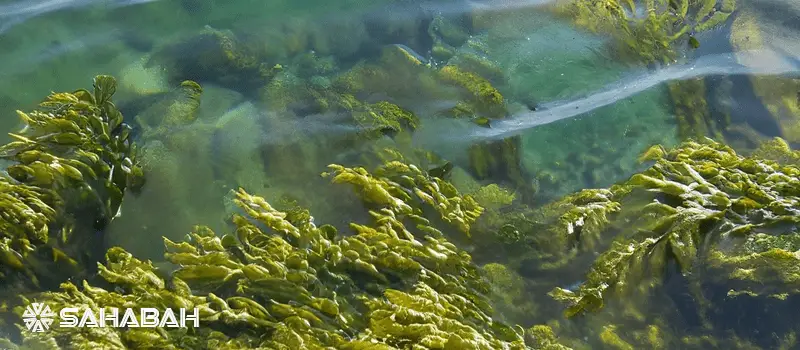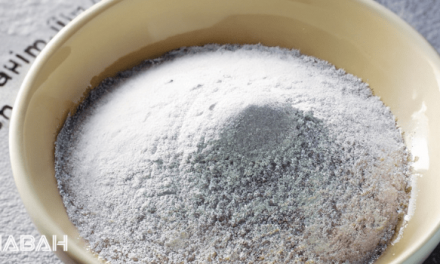Seaweed is a type of marine algae that grows in oceans, seas, and other saltwater bodies. Seaweed has been used as an ingredient in various cuisines across the world for centuries, especially in coastal communities.
Some common uses of seaweed include:
- Food products like sushi rolls, broths, and seasonings
- Thickening and gelling agents like agar-agar or carrageenan
- Nutritional supplements and vitamins
The question around seaweed relates to whether it is considered “halal” – meaning permissible or lawful in Islamic law. The Quran provides guidance on what foods are allowed for Muslims to consume:
“Lawful to you is the pursuit of water-game and its use for food – for the benefit of yourselves and those who travel…” (Quran 5:96)
Based on this verse, most scholars agree that “the food of the sea” is halal. However, there is some debate on whether seaweed qualifies within this category since it is not a fish or sea creature, but rather a marine plant product.
This article will analyze the evidence related to the halal status of seaweed, including scholarly opinions and historical traditions around seaweed consumption in Muslim communities.
Evidence That Seaweed is Halal
Most Islamic scholars and opinions consider seaweed to be halal for the following reasons:
-
Seaweed is categorized as a plant product from the oceans, not an animal product:
“Seaweed and other algae are halal because they are plant-like organisms and not animals.” (Source)
-
The Quran explicitly allows consuming all plant products including those that grow in the ocean:
“It is He who subjected the sea – that you may eat from it tender meat and extract from it ornaments which you wear.” (Quran 16:14)
This verse indicates the permissibility of not just fish meat, but other products extracted from the sea as well.
-
Seaweed and other sea vegetables have traditionally been part of the cuisine of coastal Muslim communities for centuries:
“Seaweed foods have always been part of the staple diet in coastal communities such as Japan, Korea, China, Indonesia, Philippines etc. for many centuries. Therefore, it is evident that seaweed and sea vegetables are Halal.” (Source)
So in summary, the Quranic permission of sea products and scholarly consensus makes a strong case for seaweed being halal.
Arguments That Seaweed May Be Haram
While most scholars consider seaweed to be halal, some have raised concerns over its permissibility:
-
Since seaweed grows in the ocean, it may absorb or contain non-halal elements:
“Some types of seaweed and sea vegetables contain or absorb pork-derived gelatin. This is especially true for seaweed harvested from questionable sources.” (Source)
-
The exact origins and processing methods for some seaweed seasonings are unclear:
“Seaweed extracts used as food additives (thickening and gelling agents) can be of animal origin, so need to be investigated.” (Source)
-
Certain seaweeds like agar-agar resemble animal-based gelatin in texture:
“Some scholars prohibit agar-agar because of the resemblance it holds to animal gelatin in texture and appearance.” (Source)
So while these concerns are valid, they apply only to some types of seaweed from questionable sources, not to seaweed as a general category. Proper labeling, sourcing and certification can resolve these issues.
Analysis of Evidence
When analyzing the totality of evidence on the permissibility of seaweed, the majority opinion leans towards considering it halal:
-
The Quran clearly allows all seafood and plant products, which includes seaweed:
“Essentially all types of seafood and plant products taken from the sea are halal and permissible.” (Source)
-
Potential issues like absorption of non-halal elements are not unique to seaweed and apply to many foods:
“The aspects that make seaweed questionable are issues that apply to any product where origin and processing methods are unknown.” (Source)
-
Resemblance of some seaweeds to animal gelatin is not sufficient basis for prohibition:
“The majority opinion is that appearance similarities alone do not override permissibility, only doubtful ingredients do.” (Source)
So while some valid concerns exist, the evidence points to seaweed being halal, especially when proper practices around sourcing and production are followed.
FAQ: Is seaweed halal?
Does seaweed fall under the category of seafood?
No, seaweed is not classified as seafood. It is a type of marine algae or plant that grows in the sea.
Does seaweed contain any non-halal ingredients?
No, seaweed does not contain any non-halal ingredient such as pork. It is purely a plant-based food.
Is seaweed considered halal in Islamic teachings?
Yes, seaweed is considered halal in Islamic teachings. Muslims are allowed to consume it.
What is the opinion of the Hanafi school regarding seaweed?
The Hanafi school of thought permits the consumption of seaweed as it is considered halal.
Is seaweed flavoring halal-certified?
Seaweed flavoring can be considered halal if it is derived from permissible sources and has valid halal certification.
Is it permissible to eat seaweed snacks?
Yes, it is permissible to eat seaweed snacks as long as they do not contain any non-halal ingredients.
Does seaweed contain protein?
Yes, seaweed does contain protein, although the amount may vary depending on the species.
Is iodine derived from seaweed halal?
Iodine derived from seaweed is generally considered halal as it is derived from a permissible source.
Are similar sea creatures like shrimp and crab halal?
Shrimp, crab, and similar sea creatures are considered halal and can be consumed by Muslims.
Seaweed Permissability in Islam
In summary, the preponderance of evidence indicates that seaweed is generally considered halal in Islam:
-
The Quran explicitly allows all seafood and plant products, which includes various types of marine algae like seaweed
-
Most Islamic scholars and schools of jurisprudence endorse the consumption of seaweed, based on the above Quranic justification
-
Historical traditions show seaweed as part of the cuisine in many coastal Muslim communities over centuries
However, there are some valid concerns when it comes to certain modern seaweed-based products:
-
Muslims should be cautious of questionable sourcing and unclear production methods
-
Seeking out reputable halal certification and labels is recommended to avoid any doubtful ingredients
-
Further research is needed on processing of some seaweed seasonings and supplements
So while the majority opinion permits seaweed consumption, Muslims uncomfortable with any ambiguity can avoid seaweed or opt for products that have been certified halal. Overall, seaweed appears aligned with Islamic dietary principles, but care must be taken regarding origins and ingredients.





